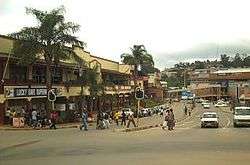Mbabane
| Mbabane | |
|---|---|
|
A street in downtown Mbabane | |
 Mbabane Location of Mbabane in Swaziland. | |
| Coordinates: 26°19′S 31°08′E / 26.317°S 31.133°E | |
| Country |
|
| District | Hhohho |
| Founded | 1902 |
| Area | |
| • Total | 150 km2 (60 sq mi) |
| Elevation | 1,243 m (4,078 ft) |
| Population (2010) | |
| • Total | 94,874 |
| • Density | 630/km2 (1,600/sq mi) |
| Postal code | H100 |
| Website |
www |
Mbabane (/(əm)bɑˈbɑn(i)/, Swazi: ÉMbábáne), with an estimated population of 94,874 (2010), is the capital and largest city in Swaziland. It is located on the Mbabane River and its tributary the Polinjane River in the Mdzimba Mountains. It is located in the district of Hhohho, of which it is also the capital. The average elevation of the city is 1243 meters. The population (estimated) in 1987 was 30,000.[1] It lies on the MR3 road.
History
The town grew after the nation's administrative centre moved from Bremersdorp (now called Manzini) in 1902. It derives its name from a Chief, Mbabane Kunene, who lived in the area when British settlers arrived.
Economy
Mbabane's closest border crossing to South Africa is Ngwenya-Oshoek, and though siSwati is the primary language, English is widespread. Mbabane, and Swaziland itself, depend on tourism and sugar exports. It is also a commercial hub for the surrounding region, while tin and iron were mined nearby. The city has two sites for light industries.
Education and culture
Mbabane is the home of the Waterford-Kamhlaba United World College of Southern Africa, as well as one of the three campuses of the University of Swaziland. Limkowking University of Creative Technology is a private international university that lies by the South African-Swaziland border with several university candidates from Swaziland. Indingilizi Gallery is an art gallery in Mbabane, established in 1982 and showcases a range of Swazi art, including sculptures, paintings, batiks, mohair, ethnic jewellery and pottery.[2]
Geography and climate
Mbabane is located in the district of Hhohho, of which it is also the capital, and lies on the Mbabane River and its tributary the Polinjane River in the Mdimba Mountains. The average elevation of the city is 1243 meters. Neighbourhoods and suburbs include Mbangweni, Sidwashini, Kent Rock, Sandla, Westridge Park, Malunge, New Checkers, Msunduza and Vukutentele.
Due to its altitude, Mbabane features a moderate subtropical highland climate (Cwb). The city has a mild climate and snow is a rare event, which has occurred only 3 times since 1900. The city averages only four days of frost a year. The average annual temperature is 11 °C (52 °F) in July and 22 °C (72 °F) in January.[3]
| Climate data for Mbabane | |||||||||||||
|---|---|---|---|---|---|---|---|---|---|---|---|---|---|
| Month | Jan | Feb | Mar | Apr | May | Jun | Jul | Aug | Sep | Oct | Nov | Dec | Year |
| Average high °C (°F) | 24.9 (76.8) |
24.5 (76.1) |
24.1 (75.4) |
22.6 (72.7) |
21.4 (70.5) |
19.3 (66.7) |
19.8 (67.6) |
21.3 (70.3) |
23.2 (73.8) |
22.8 (73) |
22.5 (72.5) |
23.7 (74.7) |
22.5 (72.5) |
| Average low °C (°F) | 14.9 (58.8) |
14.5 (58.1) |
13.4 (56.1) |
11.0 (51.8) |
7.9 (46.2) |
4.7 (40.5) |
4.6 (40.3) |
6.6 (43.9) |
9.5 (49.1) |
11.3 (52.3) |
12.9 (55.2) |
14.2 (57.6) |
10.5 (50.9) |
| Average rainfall mm (inches) | 253.2 (9.969) |
224.6 (8.843) |
151.6 (5.969) |
87.9 (3.461) |
33.8 (1.331) |
19.4 (0.764) |
20.1 (0.791) |
35.1 (1.382) |
69.4 (2.732) |
141.9 (5.587) |
197.8 (7.787) |
206.9 (8.146) |
1,441.7 (56.76) |
| Average rainy days | 16.9 | 14.3 | 13.8 | 9.8 | 5.1 | 2.8 | 3.1 | 6.5 | 9.2 | 14.9 | 17.0 | 16.5 | 129.9 |
| Source: World Meteorological Organization[4] | |||||||||||||


International relations
Twin towns – Sister cities
Mbabane is twinned with:
References
- ↑ Whitaker's Almamack; 1988
- ↑ "Indingilizi Gallery". Swaziplace.com. Retrieved 21 March 2012.
- ↑ The Cambridge Factfinder; 4th ed.
- ↑ "World Weather Information Service – Mbabane". World Meteorological Organization. Retrieved 21 December 2015.
- ↑ "Mbabane". Sister Cities International. Retrieved 11 April 2014.
- ↑ "Taipei - International Sister Cities". Taipei City Council. Archived from the original on 2012-11-02. Retrieved 2013-08-23.
- ↑ "Maputo". Tourism in Swaziland. Retrieved 2015-03-17.
External links
-
 Media related to Mbabane at Wikimedia Commons
Media related to Mbabane at Wikimedia Commons
Coordinates: 26°19′S 31°08′E / 26.317°S 31.133°E
|
